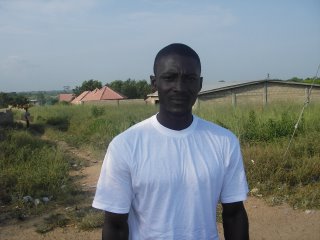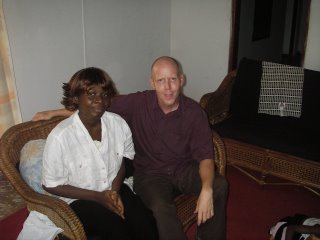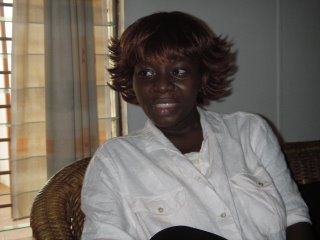A Day
the morning . . .
Watson is a 27 year old who
 , during the war in Liberia, had been seriously beaten in the head with the butts of rifles and had a number of other abuses done to him. As a result, he now has a lot of difficulty hearing. About 6 months ago we began the process of going to the audiologist for tests and to explore what could be done to help Watson in his situation. Just prior to my break in the beginning of August, we were finally preparing for his receiving hearing aids. However, the audiologist at Korle Bu (the teaching hospital in Accra) told us that he wouldn’t have any more solar powered ones available for a couple of months. So, Watson was prepared to wait for my return from break. (We had been referred to Korle Bu because they have behind the ear hearing aids, rather than the hearing aids we usually get which have cords going from the earpiece to a little pocket machine. We usually get these because they are more affordable and because the needs of the children in our school may change over time. And we wanted solar powered ones to avoid the ongoing expense of replacing the costly batteries.)
, during the war in Liberia, had been seriously beaten in the head with the butts of rifles and had a number of other abuses done to him. As a result, he now has a lot of difficulty hearing. About 6 months ago we began the process of going to the audiologist for tests and to explore what could be done to help Watson in his situation. Just prior to my break in the beginning of August, we were finally preparing for his receiving hearing aids. However, the audiologist at Korle Bu (the teaching hospital in Accra) told us that he wouldn’t have any more solar powered ones available for a couple of months. So, Watson was prepared to wait for my return from break. (We had been referred to Korle Bu because they have behind the ear hearing aids, rather than the hearing aids we usually get which have cords going from the earpiece to a little pocket machine. We usually get these because they are more affordable and because the needs of the children in our school may change over time. And we wanted solar powered ones to avoid the ongoing expense of replacing the costly batteries.)Upon my return from break, and after calling to find out that the solar powered hearing aid shipment had arrived, Watson and I left the camp early one morning so we could get to the audiologist in plenty of time, and we were fortunate since there was very little traffic. The solar powered hearing aids, however, made things louder for Watson, but not clearer. The audiologist tried a battery powered behind the ear aid which amplified things a little less and which he hoped would help to make things a little clearer – however, it was still not helpful for Watson. While the audiologist left the room to find another hearing aid to try out, Watson and I were left alone for awhile. We were talking and all of the sudden this guy, who’s always been hopeful and good-natured, broke down. He put his head down and just started sobbing. The tears were coming down his cheeks. He started sharing his concerns with me – how will he be able to go to school to advance any more in his field because he can’t make out what the teachers are saying; how will he ever support his family which is relying on him and now . . . what will he do?
I don’t often see such sincere heartbreak here – such a sincere sense of lost hope – such a sincere, sudden fear and acceptance of a limiting condition all realized at the same time. I’ve always liked Watson – he’s never come to me – as so many others do – expressing feelings of hopelessness, self-pity, neediness, etc. So when these emotions came out – when he shared this vulnerability with me – I was touched deeply.
We talked. After the audiologist came back and said maybe the ENT could recommend something more, but probably not, we went to check the ENT’s hours and decided when we’d come back to re-visit the ENT (Watson had been there before, but had been referred to the audiologist – so the cycle is coming around to completion). Then we went for lunch. We talked of all the possibilities still out there for him. We talked of ways for him to still further his education in his field of masonry (learning about drafting and plumbing so as to strengthen his skills and knowledge of building here) – of adaptations that could be made to the learning environment, etc.
Things like this are so hard here. When you are living and working here and you know of the possibilities that are out there – the medical interventions that could take place if only . . . if only . . . but don’t take place because of technological limitations here – it’s frustrating.
the afternoon . . .
Another angering and frustrating limitation is the care available for Abbie, who I’ve written about a number of times in the past (even pre-blog). The surgeon and the oncologist and the other caregivers all agree that her condition could be managed much better if she were somewhere “in the west.” How to get her “to the west”? is the question, though. And, if she gets there, then how will the costly chemotherapy and the other needs for the management of her condition be paid for? And if we can get the documentation from a doctor or clinic in the west saying they are ready to treat her, and further documentation showing that all the expenses will be covered – will we be able to get the VISA needed? If anyone has any suggestions on where to turn for answers to these questions, please feel free to give advice. Better yet, feel more than free to research it and come up with some answers – because I don’t know where to turn, and she’s breaking my heart.
After lunch, Watson and I went to pick up Abbie from the hospital where she had the tumors and also her breast removed. She was being discharged and I was helping her to get to a friend’s house where she’d stay while continuing to heal from the surgery. When I got to her room she was quiet and kept her head down. Her Aunty was in the room with her, and soon the friend she’d be staying with showed up with some food for her (patients in hospitals here need to supply their own food, so they always need a caregiver to stay with them). Abbie ate a little, but kept her head down, and occasional tears slipped out.
A couple of nights earlier when I’d visited, Abbie had been sitting outside, calm, at peace and enjoying the ‘cool’ evening air. This change in her demeanor was troubling. When her Aunty and friend left the room briefly she whispered to me that she had seen herself that morning when they changed the dressing. The sore was “so big . . . like raw meat.” It frightened her.
All through the previous year and a half of chemotherapy and radiation, Abbie (like Watson, who was waiting outside) had never slipped into self-pity, unlike so many others I see every day. We’ve gradually come to know each other. And, as with Watson earlier in the day, this sharing of raw emotion, this trust moved me deeply.
Abbie has a tremendous faith. She strongly believes she will be fine. Anytime I am with her prayer is involved – she finds her strength and peace in prayer during this time when she has no-where else to turn but to God. I’ve seen her more desperate and broken in the past couple of months than I remember seeing almost anyone in the past – yet her faith and trust in God has continued to remain strong. Abbie and her faith inspire me, and, as I said above, her courageous battle breaks my heart.
I haven’t taken many pictures of Abbie – I wanted to give her the privacy and respect. But a co-worker asked me recently “why haven’t you taken any pictures? You’ve always had the camera with you.” And some people who have been reading about her told me they wish I had included a picture of her. So, two days after I took her to her friend’s house, I was there for a visit and asked her if she wanted me to take some pictures of her. She had just returned from having her dressing changed, she was feeling calm (and I think maybe a little bit drugged to dull the pain from changing the dressing). The friend she was staying with had given her a wig to wear.


 Abbie’s walking an emotional tightrope. She has strength, faith, hope, confidence. Yet, shortly after taking these pictures she was in tears.
Abbie’s walking an emotional tightrope. She has strength, faith, hope, confidence. Yet, shortly after taking these pictures she was in tears.

3 Comments:
Gosh this just breaks my heart--I wish I could come up with some answers for you.
Thanks so much for including some pictures of Abbie. I wish I could come up with something, but so far I haven't been able to get anywhere either. I'm going to try to remember to check with the oncologist the next time I'm there and see if he has any suggestions.
Steve - just found your blog, like the look of it. I volunteer with The Vision, buduburam's newspaper. If you get a chance check out the web site i helped them put together: thevisiononline.net .
Post a Comment
<< Home